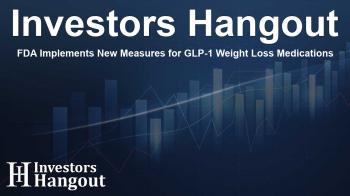FDA Implements New Measures for GLP-1 Weight Loss Medications

FDA Establishes Import Alert for GLP-1 Medications
The U.S. Food and Drug Administration (FDA) has taken significant steps to safeguard consumers by launching a new import alert targeting potentially hazardous glucagon-like peptide-1 (GLP-1) active pharmaceutical ingredients (APIs). This initiative, referred to as the "green list," is designed to prevent unverified foreign sources from entering the U.S. market and potentially putting patients at risk.
Overview of GLP-1 Drugs
Notable GLP-1 medications like Novo Nordisk A/S’ semaglutide and Eli Lilly and Co.’s tirzepatide are currently FDA-approved for specific health conditions, including type 2 diabetes and, in some instances, as a part of chronic weight management strategies. These medications have garnered attention for their effectiveness in managing weight and supporting metabolic health.
Compounded Versions Raise Concerns
Though the FDA has approved specific GLP-1 medications, reports suggest that some patients are turning to compounded versions that lack FDA endorsement. The agency recognizes these compounded alternatives can pose health risks, which is why the green list will only include GLP-1 APIs from facilities that have undergone proper FDA inspections and are compliant with regulatory standards, thereby enhancing patient safety.
Detention of Non-Compliant Drugs
APIs sourced from unapproved suppliers will be subject to detention without physical examination. This precaution underscores the FDA’s commitment to enforcing strict safety measures in the pharmaceutical sector, particularly for crucial medications that impact patient well-being.
The Response from Legislators
Recently, more than 80 bipartisan members of Congress addressed the FDA regarding increasing concerns about counterfeit and knockoff versions of GLP-1 medications flooding the healthcare system. Lawmakers urged the FDA to step up enforcement actions against online retailers and compounding pharmacies that traffic in unapproved weight-loss drugs, advocating for stringent monitoring and regulatory checks.
Coordination with Customs
The legislators also called for increased collaboration between the FDA and Customs and Border Protection (CBP). They emphasized the need for alert systems to monitor and deter unsafe GLP-1 medications introduced to the U.S. market. These urgent calls to action reflect the seriousness of the situation and a commitment to public health safety.
WHO Updates Essential Medicines List
On a parallel note, the World Health Organization (WHO) has announced updates to its Model List of Essential Medicines (EML) and the Essential Medicines for Children (EMLc). Notably, they have included GLP-1 receptor agonists such as semaglutide and liraglutide, along with the dual receptor agonist tirzepatide, as essential medicines. This recognition highlights their importance in treating diabetes and associated conditions like obesity.
Wider Implications for the Pharmaceutical Industry
As the market adjusts to the FDA's regulatory framework, it’s crucial to observe how pharmaceutical companies, particularly Novo Nordisk and Eli Lilly, will respond to these challenges. There is a growing trend among Chinese manufacturers to pivot from producing unverified knockoffs to focusing on generic formulations of established weight loss drugs such as Novo Nordisk’s Wegovy and Eli Lilly’s Zepbound. This shift indicates a strategic alignment with regulatory demands and changing market dynamics.
RAW Ingredient Supply Dynamics
In light of unprecedented demand for GLP-1 medications, several Chinese pharmaceutical firms have previously supplied raw ingredients that contributed to the production of substantial amounts of temporary dosages within the past year. Such developments have influenced the marketplace for weight management solutions significantly.
Conclusion
The FDA's proactive measures to protect consumers and ensure quality in weight loss medications underscore the need for vigilance in healthcare. With recent changes made by both the FDA and WHO, there is an urgent call for all stakeholders in the pharmaceutical industry to align properly with established parameters, ensuring that patient safety and effective treatments remain top priorities.
Frequently Asked Questions
What are GLP-1 medications?
GLP-1 medications are a class of drugs used primarily to manage type 2 diabetes and regulate weight. They include well-known drugs like semaglutide and tirzepatide.
Why has the FDA established a green list?
The FDA's green list aims to filter out unsafe GLP-1 APIs from unverified foreign sources, ensuring only compliant drugs enter the U.S. market.
What implications does the green list have for patients?
The green list serves to protect patients by reducing the risk of receiving unapproved and potentially harmful medications.
How are lawmakers responding to potential counterfeit drugs?
Lawmakers are pushing the FDA for stricter regulatory enforcement against counterfeit GLP-1 drugs and urging coordination with authorities to prevent illegal imports.
What recent additions has WHO made to its essential medicines list?
WHO has added several GLP-1 receptor agonists to its essential medicines list, recognizing their importance in treating diabetes and associated complications.
About The Author
Contact Ryan Hughes privately here. Or send an email with ATTN: Ryan Hughes as the subject to contact@investorshangout.com.
About Investors Hangout
Investors Hangout is a leading online stock forum for financial discussion and learning, offering a wide range of free tools and resources. It draws in traders of all levels, who exchange market knowledge, investigate trading tactics, and keep an eye on industry developments in real time. Featuring financial articles, stock message boards, quotes, charts, company profiles, and live news updates. Through cooperative learning and a wealth of informational resources, it helps users from novices creating their first portfolios to experts honing their techniques. Join Investors Hangout today: https://investorshangout.com/
The content of this article is based on factual, publicly available information and does not represent legal, financial, or investment advice. Investors Hangout does not offer financial advice, and the author is not a licensed financial advisor. Consult a qualified advisor before making any financial or investment decisions based on this article. This article should not be considered advice to purchase, sell, or hold any securities or other investments. If any of the material provided here is inaccurate, please contact us for corrections.

